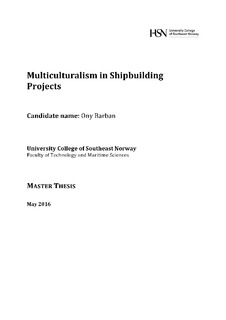Multiculturalism in shipbuilding projects
Master thesis
Permanent lenke
http://hdl.handle.net/11250/2416419Utgivelsesdato
2016Metadata
Vis full innførselSamlinger
Sammendrag
The global nature of shipbuilding projects has highlighted the importance of multiculturalism and the challenges and opportunities it brings to project execution.
An embedded single case study has been conducted to address the main research question: How is multiculturalism related to success in shipbuilding projects? The main findings show that different aspects of multiculturalism can have different impacts on project activities, both positive and negative, thus affecting the final successful outcome of the project. It was identified that synergy and wide problem-solving skills in project team are positive effects of multiculturalism, while negative ones relate to physical distance and delocalization, different working techniques and working attitudes, compliance with other habits, languages and regulations.
First, a definition of project success is provided, which can vary according to the involved project stakeholders; then, several success factors are identified. Those rely to “hard” issue of project management, such as planning and technical specifications, and to more intangible factors such as trust among project team members.
The study finds that project management strategies can mitigate the negative impacts of multiculturalism and increase the positive ones.
The study presents theory and findings connected with project management strategies that can mitigate the negative impacts of multiculturalism above mentioned and increase the positive ones. Some of these strategies refer to: team selection and composition, team integration, awareness of cultural differences, communication and management styles. The study has theoretical and practical implications as well as future research suggestions aimed at improving the theory on multiculturalism as facilitator of communication in project settings.
